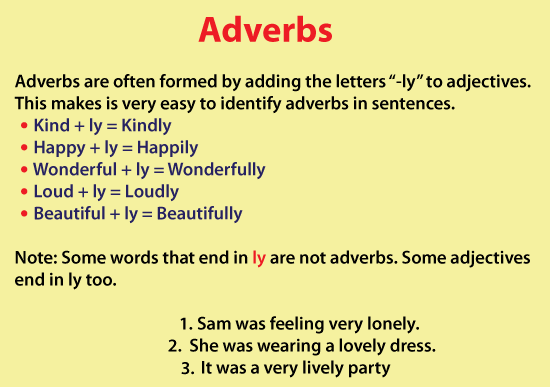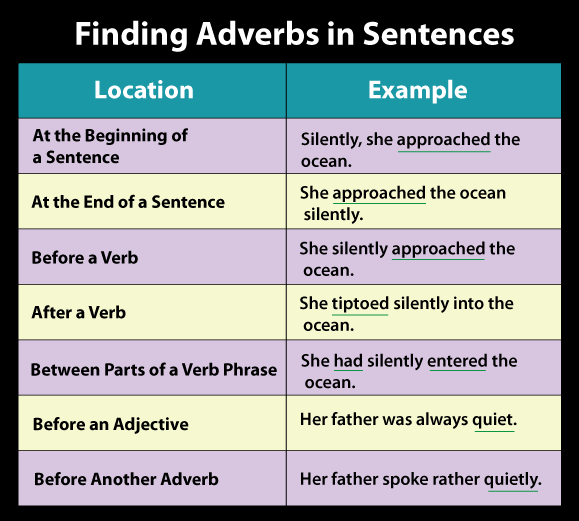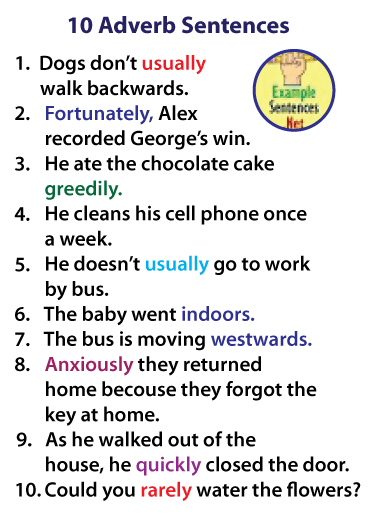Adverb SentencesIntroductionAdverbs can be challenging to writers since they serve a range of purposes in the English language. Examining examples of adverbs and adverb phrases will help you identify and successfully employ this component of speech. You can add more description, describe an action, or amplify the meaning of yet another term with the help of a few adverbs. What Is an Adverb?An adverb or adverb sentences comprise or a term that is utilized to transform, alter, or qualify other terms, such the adjectives, verbs, clauses, another adverbs, or other sorts of words or phrases, with the exception of the determiner and adjective that straight away alter the noun. Adverbs in simpler terms can be referred of as terms that offer context, that is a useful approach to get hold of them. Adverb, in particularity, describe how something works. Adverbs, in specific, illustrate how, where, when, in what way, and to what degree something is accomplished or happened. Normally, we can recognize an adverb by the fact that it most often ends with -ly, but there are several adverbs that do not. Moreover, adverbs can be employed in a variety of ways. 
Adverbs, are a crucial part of speech in English Grammar. These satisfy a variety of the tasks, thus, making it difficult to consider them as a single, coherent class. Therefore, identification of the adverb, especially one concluding in -ly, is easy. Adverbs usually serve to provide a more comprehensive picture by explaining how something happens, such as
Adverb SentencesSome adverbs look at the whole sentence instead of just a part of it. They are known as sentence adverbs, and they serve as a comment, indicating the speaker's or writer's attitude or viewpoint toward a specific scenario. Adverb sentences are frequently used at the starting of the sentence. Following are some instances:
(= There have clearly been intolerable delays.)
(= It's unfortunate that the woods are constantly under attack.)
(= It's odd that he never went to the U.S.A.) 
The sentence adverbs are utilized to indicate the writer's or speaker's view that something occurred or is the case in a clear/sad/curious manner. When you compare how plainly, regretfully, and strangely are used in the following three sentences, you can immediately see the distinction between the meanings of the sentence adverbs and the meaning of the 'ordinary' adverbs:
(= He talked clearly and authoritatively.)
(= She grinned in a depressing way.)
(= He gave her a puzzled look.) 
Adverb Sentences on The Basis Of TypesAdverbs improve your sentences and make your work more detailed and fascinating. Consider the adverb examples provided below. Adverbs Sentences of Time - When an Action Takes PlaceAdverbs of time have been highlighted for ease of recognition;
Adverbs Sentences of Manner - How an Action Is Taking PlaceAdverbs of Manner have been highlighted for ease of recognition;
Adverbs Sentences of Place - Answer the Question 'Where'Adverbs of Place have been highlighted for ease of recognition;
Adverbs Sentences of Degree - The Scope of Action Or the Extent to Which It Takes PlaceAdverbs of Degree have been highlighted for ease of recognition;
Adverb Sentences of Frequency - How Frequent an Action Is Taking PlaceAdverbs of Frequency have been highlighted for ease of recognition;
Adverbs Sentences ExamplesNow let us have a look at few adverb sentences. Adverbs have been highlighted in the following sentences for ease of recognition.
Adverb phrases can begin with a preposition or the infinitive version of a verb and do not always include an adverb. Thus conclusively, adverb sentences act similarly to adverbs in that they alter a verb or adjective. They supplement a statement by telling us when, how, where, and to what extent. In the realm of grammar, an adverb or adverb phrase is a journeyman, modifying and strengthening the meaning of the associated verbs, adjectives, or adverbs. When you employ many adverbs, you risk alienating your reader with complex, difficult-to-read text. Adverbs or the adverb sentences on the other hand, should be used cautiously.
Next TopicDifference Between Adjective and Adverb
|
 For Videos Join Our Youtube Channel: Join Now
For Videos Join Our Youtube Channel: Join Now
Feedback
- Send your Feedback to [email protected]
Help Others, Please Share









